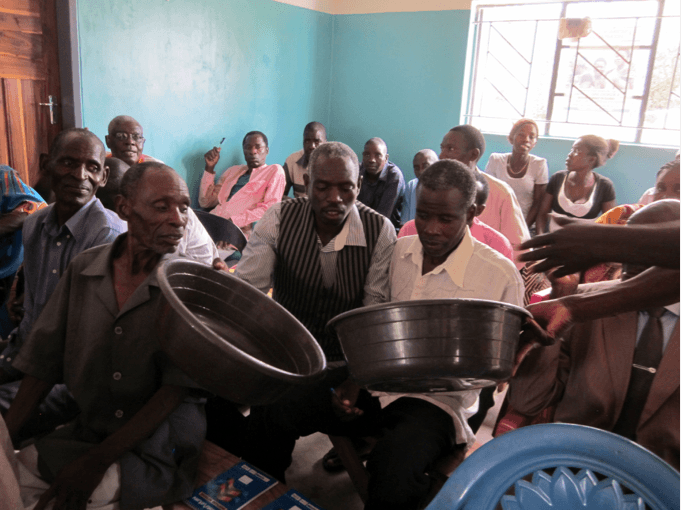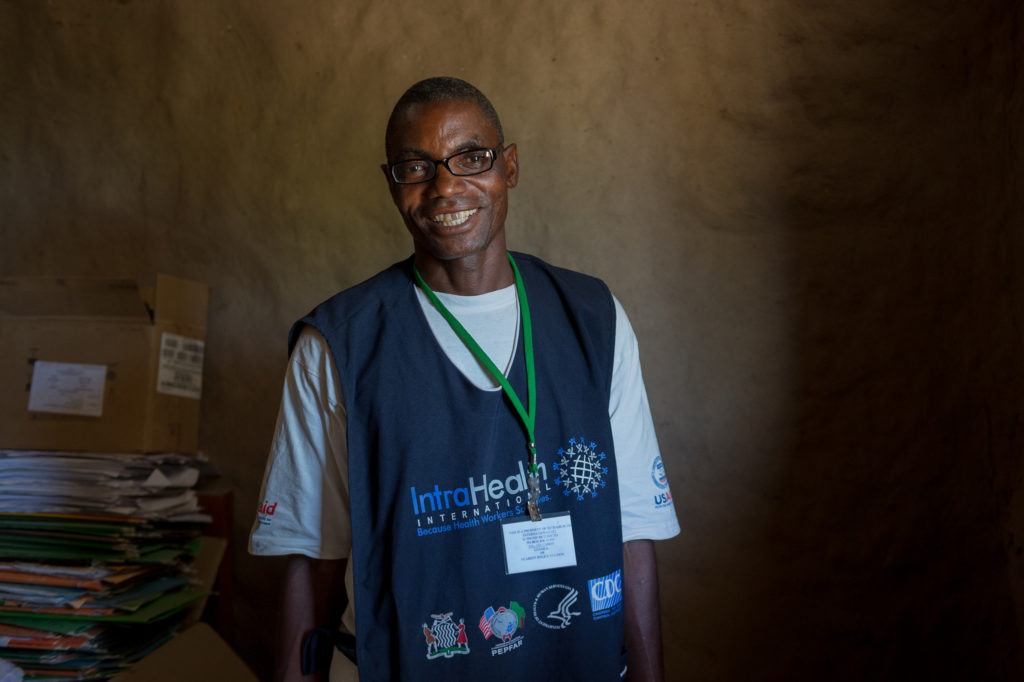Lucky Number Twenty Three: Educating for Change

Rose Paneno is one of our amazing international volunteers currently serving with our community in Mwandi, Zambia. Her work is focused specifically on improving access to water, sanitation, and hygiene in communities. This relies a lot on community education and encouraging behavior change.
Rose recently celebrated her 23rd birthday in Zambia and to celebrate, she ran a workshop for community leaders! Read about her experience.
The birds outside were screeching noisily. This was a good sign for me as I rolled out of bed and pulled on my CMMB Volunteer shirt and mandatory Chitenge– the traditional fabric wrap that women wear in Zambia. Mostly the bird noises meant that it had rained the night before and that there would be a break between the thunderstorms. Incredible thunderstorms constantly roll through Mwandi district this time of year, wreaking havoc on even the best-laid plans. Roads flood for months and it’s difficult for people to make it to community meetings.
But today, there was a break in the rain. And for newly 23-year-old me, it was a pretty great gift from God.
For several weeks I had been planning a meeting for the local Indunas (village chiefs) around the Simongoma Health Outpost. Indunas are one of the hallmarks of life in Mwandi. They are seen as the paternal guides of their communities. In short, if they are with you, you will succeed. If they aren’t, pack your bags.

Indunas smiling during a health presentation
CMMB has a strong relationship with many of the local Indunas, and have been warmly welcomed to work in Mwandi by the Lozi Chief, the man above all the other Indunas. Yet, sometimes in the communities things can be a little different. The teams of volunteers in Simongoma had reported some resistance from their local Indunas. When the volunteers attempted to encourage the communities to build latrines, one Induna reportedly confronted them for insulting his village, and made it impossible for the volunteers to continue their work.
When they told this story to me in their monthly meeting, I knew we had to do something. Working with the waster, sanitation, and hygiene (WASH) volunteers – also known as champions – and the renowned Simongoma community health worker, Mr. Zuze, we made a plan to invite the local Indunas for a day filled with community health education.
Instrumental to our plan was the Silalo Induna, a leader who reports directly to the Lozi Chief in Mwandi. He was more than willing to help us organize the event after we explained our concerns. He suggested we make a day of the event and educate the community about all of the community health workers’ activities in the area.
By the time we got to the Simongoma health outpost – about a 45 minute bumpy ride from the Mwandi Mission Hospital – and unloaded our materials, there were already many people gathering outside. Smiles and laughs abounded as I practiced the small bit of Lozi I have come to know, greeting these well-respected men who walked several kilometers from their own communities to attend.
Also present were the head and deputy head of the Simongoma Primary School, as well as various representatives from the local volunteer groups and even the nurse-in-charge of the nearest health facility.

Brightone Gondwe is a nutritionist and skilled volunteer trainer emphasizes the importance of nutrition for children under five and breastfeeding mothers.
The meeting started with introductions. As always, there were a few minutes of confusion as I observed how to act in a room full of Indunas. As it turns out, proper etiquette demands clapping and bending down to an almost full kneel. It is a difficult balancing act with a piece of cloth tied around you from hip to ankle. Go figure.
Educating for Change
Greetings aside, we began the important work of teaching this group of well-respected individuals. The Silalo Induna began by speaking about the importance of learning what we present, and bringing it back to the communities. He also emphasized that we may speak about embarrassing or troubling things (i.e. defecation), but our intent was not to insult, but to empower. He reminded them that we had the metaphorical seal of approval from the Lozi Chief himself, so there was nothing to be worried about.
Then I began the first educational session of the meeting. With Mr. Gondwe’s and Mr. Shimwala’s skilled Lozi translation, we discussed what causes diarrhea and why diarrhea is dangerous. Many of the communities here have high rates of diarrhea. Diarrhea is not considered by locals to be acutely abnormal on its own. This is a far cry from my childhood, where diarrhea was a convenient excuse to get out of school (if you forgot about the disgusting taste of Pepto Bismol).
As expected, many Indunas laughed as I pointed to a hand drawn picture of a man walking to the bush to relieve himself. The drawing had a troubled look on his face. “Why is that?” I asked. They answered “He’s embarrassed to be caught!”
After our discussion about the causes and consequences of diarrhea, we welcomed our WASH Champions to the floor. They presented on diarrhea prevention and the importance of building latrines. Latrines are very uncommon in this community. Most people don’t build them because they don’t see a reason to change their habits. Our hope was to confront these Indunas with the dangers associated with open defecation and it’s potential to contaminate water supplies and food. The WASH Champions reiterated this point, and discussed the importance of community built, locally sourced latrines that are more sustainable and are more likely to be used.
The WASH Champions also facilitated a hand-washing demonstration. First they showed how little dirt is removed from washing two people’s hands without soap– a common practice here. Then the same two individuals washed their hands again with soap. This time the water was murky– you could see how much dirt had been removed. The Indunas were very surprised at the difference.

SMAG and MTA member Beatrice participates in the hand-washing demonstration.
Improving Nutrition
For those who know me, it is little wonder that the next part of the meeting was the part I was most looking forward to – LUNCH! The Nutrition Champions had prepared a traditional meal of nshima, gravy, cabbage relish, and village chicken. With our stomachs full, it was the perfect time for these formidable ladies to share with the Indunas the importance of proper infant and young child feeding, as well as how to identify and refer malnourished children to the local health center.
Taking the floor after the nutrition ladies was an Induna himself. Induna Kekelwa Muyoyeta was the active voice for the Men Taking Action group of Simongoma. Men Taking Action is a community outreach group that works to integrate men into issues of maternal and child health – an important goal for mobilizing the entirety of the family’s resources to it’s well-being. Passionately appealing to his fellow Indunas, he reminded them of the importance of escorting their wives and children to antenatal and postnatal care sessions, and the under-five clinic. He reminded them of their roles not only as fathers, but also as the honorary fathers of their communities.
The day wrapped up with the Silalo Induna and Mr Zuze facilitating a discussion on the way forward. Each of the Indunas stood and expressed their commitment to the lessons they had learned. They called for each one of themselves to be better at welcoming the volunteers in their communities. They promised to be role models, building their own latrines, washing hands, treating their water, and taking their family members to the clinic for antenatal and postnatal care. They also enthusiastically expressed their intention to share what they had learned at this meeting with all those in their respective communities. The brightness of their smiles and enthusiasm was a stark contrast to the resistance that Mr. Zuze and the team had received from them in the months before. It was an impressive reminder of the power of education and behavioral change.
Just before leaving I glanced through the attendance roster. An impressive number of people had been crammed into the health outpost that day. Over 30 attendees! And when I counted the number of Indunas, I couldn’t help but laugh.
Twenty-Three Indunas.
Twenty-Three more people empowered to help their communities thrive.

Rose when she first arrived in Zambia.
